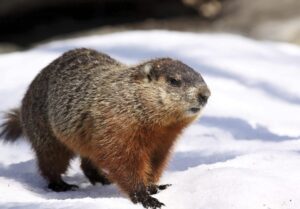
There are a few ways you can winterize your yard to support your local wildlife populations and make winter a lot easier for them.
Winter is coming, and for some people, it means a time of year when we worry a little bit about our local wildlife and wonder how we can help them get through this difficult season. There’s a bit of a fine line to walk when helping wildlife—how much help is too much? If you have any questions, it never hurts to talk to your local wildlife shelter or rescue for tips on what is safe, what isn’t, and what your best options are.
Put Out Feeders
Up to 50% of American homes have some type of bird feeder available in their yard year-round for our feathered friends. Putting out a quality bird feeder that is squirrel-proof and filled with bird-appropriate seeds and foodstuffs is an excellent first step in helping out your local wildlife.
For small mammals, you shouldn’t allow them to become dependent on free meals at your front door, but it’s okay to have a treat station in an area away from your home where you can set out a small amount of food on occasion. For squirrels, you can set out some hazelnuts or walnuts, as well as some beans, carrots, spinach, or apple pieces. Another great way to feed some mammals is to plant edible flora that is local to your area. This will greatly benefit wild rabbits who can use berry bushes as both a food source as well as a shelter.
It is not recommended that you feed larger animals, such as deer. They are notorious for becoming too comfortable and walking up to homes, destroying gardens, and bringing their friends over unannounced. If you’re determined, you can place a wood board with raised sides outside as far away from your home as possible—even better if you have a wooded area away from your home—to keep them from getting too close and comfortable on your property. Horse pellets are considered the best kind of feed to leave out as it is nutritionally balanced and not overly starchy like corn, which is commonly offered.
Offer Shelter
One of the best ways to offer shelter to wildlife is to have it built right into your garden. Squirrels and birds will make nests in your trees, while rabbits will set up dens under dense bushes. You can also build a large brush pile by starting with large limbs and building it up loosely, adding yard debris such as grass and leaves throughout the structure. This will provide a great nesting area for ground-nesting birds, rabbits, chipmunks, and other small wildlife. A brush pile should be kept away from the home, and preferably near your small animal treat area if you have one, so they can easily access food if they need to.
Provide Water
Many water sources will freeze in the winter, making it difficult for many animals to find fresh, unfrozen water. You can add a heater to your birdbath or simply set out a shallow bowl of water no more than 3” deep that you can check on regularly. The water needs to be shallow to be safe for birds, chipmunks, squirrels, and other small animals to prevent drowning. To keep the water drinkable, simply pour in some hot water every so often to unfreeze it.
Design and Build Your Dream Home with Columbia Builders!
Columbia Builders is the home builder of choice in Howard County, offering homes in Ellicott City, Elkridge, Laurel, Columbia, Marriottsville, Fulton, Clarksville, Dayton, and Brookeville. No matter what the size and scope of your project, we have the skills, experience, and resources needed to bring your vision to life. We offer a level of customization that is truly unmatched and are committed to using materials and craftsmen of the highest quality, so you can trust that your new home is built to last. Columbia Builders was voted Best of Howard County 2020 for best home builder.
If you’re ready to invest in a home, built with your needs in mind, trust in us. Give Columbia Builders a call today at 410-730-0215 or use our contact form here. You can also keep up with us on Facebook, Twitter, Houzz, and YouTube, and don’t forget to check back on our blog for more tips and information!
